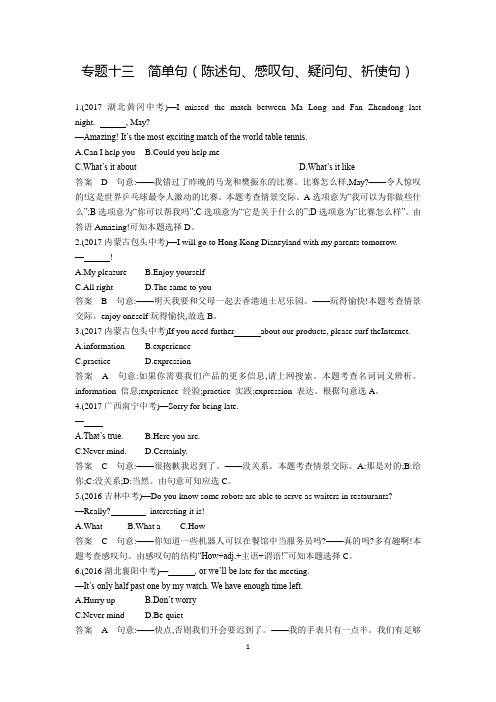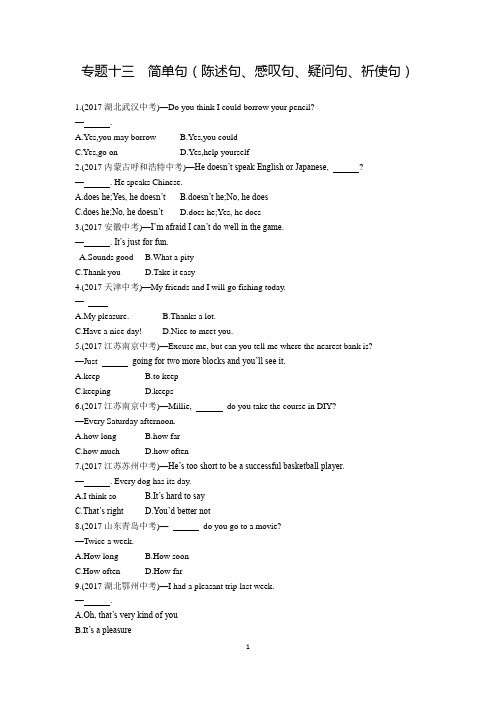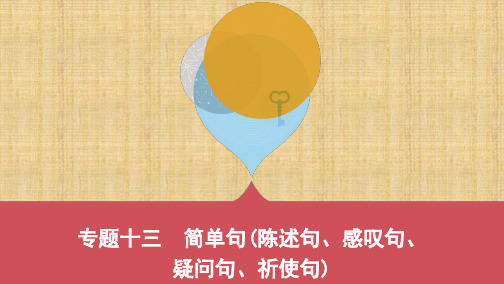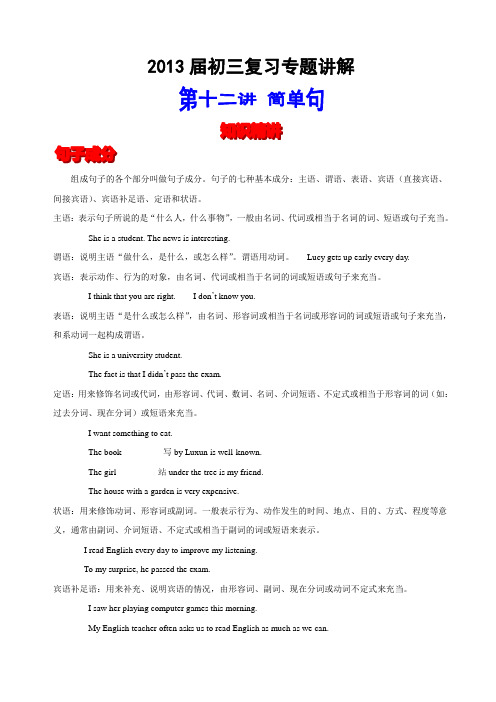专题十三 简单句(陈述句、感叹句、疑问句、祈使句)(试题部分)
简单句(陈述句、感叹句、疑问句、祈使句)精选中考试题

专题十三简单句(陈述句、感叹句、疑问句、祈使句)1.(2017湖北黄冈中考)—I missed the match between Ma Long and Fan Zhendong last night. , May?—Amazing! It’s the most exciting match of the world table tennis.A.Can I help youB.Could you help meC.What’s it aboutD.What’s it like答案D句意:——我错过了昨晚的马龙和樊振东的比赛。
比赛怎么样,May?——令人惊叹的!这是世界乒乓球最令人激动的比赛。
本题考查情景交际。
A选项意为“我可以为你做些什么”;B选项意为“你可以帮我吗”;C选项意为“它是关于什么的”;D选项意为“比赛怎么样”。
由答语Amazing!可知本题选择D。
2.(2017内蒙古包头中考)—I will go to Hong Kong Disneyland with my parents tomorrow.—!A.My pleasureB.Enjoy yourselfC.All rightD.The same to you答案B句意:——明天我要和父母一起去香港迪士尼乐园。
——玩得愉快!本题考查情景交际。
enjoy oneself玩得愉快,故选B。
3.(2017内蒙古包头中考)If you need further about our products, please surf theInternet.rmationB.experienceC.practiceD.expression答案A句意:如果你需要我们产品的更多信息,请上网搜索。
本题考查名词词义辨析。
information 信息;experience 经验;practice 实践;expression 表达。
根据句意选A。
4.(2017广西南宁中考)—Sorry for being late.—A.That’s true.B.Here you are.C.Never mind.D.Certainly.答案C句意:——很抱歉我迟到了。
2020年外研版英语中考语法复习专题13 简单句

动词的否定形式+主语?
他,情态动词的肯定形式+主语?
We should get up early, shouldn’t You can’t play the piano, can
we?我们应该早起,不是吗?
you?你不会弹钢琴,是吗?
(2)特殊形式 ①当陈述句中含有表示否定意义的代词或形容词,如nothing, none, no one, nobody, neither, few, little等,或含有表示否定意义的副词never, hardly, seldom等时,附加疑问句只能用肯定形式。 Linda has never been to Beijing, has she? 琳达从没去过北京,是吗? ②当陈述句中有含有否定前缀或后缀(如un-,dis-,-less等)的单词时,附加疑问 句要用否定形式。 He looks unhappy, doesn’t he? 他看上去不高兴,不是吗?
③祈使句的反意疑问句有两种形式:以let’s开头的,附加疑问句用shall we; 其 他形式的祈使句的附加疑问句用will you/won’t you。 Open the window, will you/won’t you? 打开窗户,好吗? ④陈述部分是there be句型时,附加疑问句应用“be there”。 There is a wallet in your car, isn’t there? 有一个钱包在你的车里,不是吗? ⑤陈述部分的主语是this, that时,附加疑问句的主语应用it;陈述部分的主语是 these, those时,附加疑问句的主语应用they。 This is a fantastic film, isn’t it? 这是一部很棒的电影,不是吗?
小升初英语之陈述句、疑问句、感叹句、祈使句、语音重点知识及练习题

祈使句一、知识梳理1.概念:祈使句是表示命令、请求、劝告或建议等的句子。
主语通常是听话者you,习惯上常省略。
谓语动词一律用原形,没有时态和数的变化。
句末用句号或感叹句,朗读时一般用降调。
Don’t be late.别迟到。
Please open the door. 请打开门。
2.祈使句的分类:一是含有第二人称主语的祈使句,二是含有第一、第三人称的主语的祈使句。
两种类型都有肯定形式和否定形式。
肯定形式前可加“do”来加强语气;否定形式一定要用don’t或never来加强语气。
Do close the door. 一定要关上门。
Don’t drive too fast.不要开得太快。
Never do that again.1. 含有第二人称主语的祈使句肯定形式肯定形式中的谓语要用动词原形或“do+动词原形”的形式。
Be quiet! 安静!Stop talking! 别讲话!Do come here on time. 务必按时来这里。
2 否定形式否定形式的谓语要用“don’t+动词原形”Don’t be late again!不要再迟到了。
Don’t play the computer games.不要打电脑游戏。
表示禁止时,特别是标语等可以用“no+动名词/名词”来表示。
No parking.(禁止停车)。
No smoking.(禁止吸烟)。
含有一、三人称主语的祈使句通常以let为引导词。
1. 肯定形式含有第一人称主语的祈使句是:Let+第一人称(me,us)+其他。
Let me have a look. 让我看一下。
Let’s go to the zoo this afternoon.咱们下午去动物园吧。
Let us try again. 让我们再试试。
含有第三人称主语的祈使句是:Let+表示第三人称的名词或代词(要用代词宾格:him,her,it,them)+其他。
Let Lucy stay at home. 让露西呆在家里。
简单句(陈述句、感叹句、疑问句、祈使句)中考题组

专题十三简单句(陈述句、感叹句、疑问句、祈使句)1.(2017湖北武汉中考)—Do you think I could borrow your pencil?—.A.Yes,you may borrowB.Yes,you couldC.Yes,go onD.Yes,help yourself2.(2017内蒙古呼和浩特中考)—He doesn’t speak English or Japanese, ?—. He speaks Chinese.A.does he;Yes, he doesn’tB.doesn’t he;No, he doesC.does he;No, he doesn’tD.does he;Yes, he does3.(2017安徽中考)—I’m afraid I can’t do well in the game.—. It’s just for fun.A.Sounds goodB.What a pityC.Thank youD.Take it easy4.(2017天津中考)—My friends and I will go fishing today.—A.My pleasure.B.Thanks a lot.C.Have a nice day!D.Nice to meet you.5.(2017江苏南京中考)—Excuse me, but can you tell me where the nearest bank is?—Just going for two more blocks and you’ll see it.A.keepB.to keepC.keepingD.keeps6.(2017江苏南京中考)—Millie, do you take the course in DIY?—Every Saturday afternoon.A.how longB.how farC.how muchD.how often7.(2017江苏苏州中考)—He’s too short to be a successful basketball player.—. Every dog has its day.A.I think soB.It’s hard to sayC.That’s rightD.You’d better not8.(2017山东青岛中考)—do you go to a movie?—Twice a week.A.How longB.How soonC.How oftenD.How far9.(2017湖北鄂州中考)—I had a pleasant trip last week.—.A.Oh, that’s very kind of youB.I t’s a pleasure1C.CongratulationsD.I’m glad to hear that10.(2017北京中考)—did you stop playing?—Because I was tired.A.HowB.WhyC.WhenD.Where11.(2017甘肃武威凉州区中考)—Our classmates are going to Fantawild Adventure(方特欢乐世界) after the exams.—exciting idea!A.WhatB.What anC.How anD.How12.(2017山东潍坊中考)—Shall we go to the amusement park right away or the day after tomorrow?—.Any time will do.A.Excuse meB.Have a good timeC.It’s up to youD.I’m afraid I can’t13.(2017甘肃兰州中考)—How often do you have a meeting one month?—.A.For one weekB.One week agoC.In one weekD.Once a week14.(2017吉林中考)—Jeff, I will take an important exam tomorrow.—A.Good luck!B.Congratulations!C.Good idea!15.(2017云南昆明中考)—?—Twice a week.A.How old are youB.How far is it from your home to schoolC.How do you get to schoolD.How often do you exercise16.(2017吉林长春中考)—The final exam is over. Will you stay at home or visit your grandparents?—. I miss them very much.A.Yes, I willB.I’ll stay at homeC.N o, I won’tD.I’ll visit my grandparents17.(2017吉林长春中考)wonderful The Reader is! Many people enjoy this TV program.A.HowB.How aC.WhatD.What a18.(2017吉林长春中考)for me at the bus station across from the post office. I can find2you easily.A.WaitB.To waitC.WaitingD.Waits19.(2016陕西中考)—Could you tell me it takes to walk to the Disneyland? —About 20 minutes.A.how farB.how longC.how oftenD.how soon20.(2016山东济宁中考)—can you read in English?—About 100 words a minute.A.How farB.How muchC.How fastD.How many21.(2016宁夏中考)—Could you tell me you will come back?—In ten minutes.A.how soonB.how oftenC.how longD.how fast22.(2016福建福州中考)—is the nearest hospital from here?—Er, it’s about ten minutes’ walk.A.How longB.How farC.How often23.(2016湖北襄阳中考)—are the students in your class?—Most of them are only fourteen.A.How longB.How oldC.How manyD.How often24.(2016天津中考)—I tried to pass the driving test, but I failed.—. Good luck to you next time.A.That’s gre atB.It’s interestingC.That’s a pityD.Glad to hear that25.(2016天津中考)—Hi,Diana,how was your summer holiday?—!I enjoyed myself in the sea very much.A.Good ideaB.Wait a minuteC.That’s too badD.Pretty good26.(2016重庆中考)—I’m sorry. I broke your t ea cup.—. I have another one at home.A.It doesn’t matterB.You’d better notC.My pleasureD.It’s too bad27.(2016重庆中考)—Mrs. Black, I’m afraid that I’ll fail the exam.—, dear! Take it easy. I’m sure you’ll pass it.A.Sorry to hear thate onC.All rightD.Good job28.(2016北京中考)—are these bananas?—$3.99.3A.How muchB.How longC.How heavyD.How big29.(2016重庆中考)—You play the piano so well. do you take piano lessons?—I go to piano lessons twice a week.A.How longB.How manyC.How oftenD.How much30.(2015上海中考)important it is for kids to imagine freely!A.WhatB.What aC.What anD.How31.(2015广东广州中考)—will the invitations be sent to our guests?—In three days.A.How oftenB.How soonC.How longD.How far32.(2015四川成都中考)—can we become good learners?—By working hard and asking the teachers for help.A.HowB.WhereC.When33.(2015内蒙古呼和浩特中考)We have to finish the work now,?A.don’t weB.haven’t weC.have weD.do we34.(2015湖南长沙中考)—Jane Zhang is going to hold a concert here in July.—Really?exciting news!A.HowB.What anC.What35.(2015河南中考)kind and helpful to the people around us,and we will make the world a nicer place to live in.A.BeB.BeingC.To beD.Been36.(2015陕西中考)o n the grass,or it will“cry”.A.To walkB.Not to walkC.WalkD.Don’t walk37.(2015上海中考)Please your exam papers once again before handing them in.A.going overB.went overC.go overD.to go over38.(2015上海中考)—father took part in the charity activity in the neighbourhood yesterday?—Peter’s.A.WhoseB.WhatC.WhichD.Who39.(2015江苏连云港中考)—What programme is so attractive?—The guard of honor(仪仗队)of the PLA are taking part in the parade on Red Square. —exciting event!A.How aB.What anC.How anD.What a40.(2015重庆中考)—did you work out the problem in such a short time?—With Mr.Li’s help.A.WhenB.WhereC.HowD.Which4答案精解精析1.D2.C3.D4.C5.A6.D7.B8.C9.D10.B11.B12.C13.D14.A15.D 16.D17.A18.A19.B 20.C21.A22.B23.B24.C25.D26.A27.B28.A 29.C30.D31.B32.A33.A34.C35.A36.D37.C 38.A39.B40.C5。
英语中考简单句(陈述句、疑问句、感叹句,祈使句,倒装句)

中考考点
考点过关训练
语法互动(十三)┃ 简单句(陈述句、疑问句、感 叹句、祈使句、倒装句)
③行为动词对应助动词的相应形式。这种助动词主要指帮 助构成疑问句或否定句的do, does, did以及它们的否定 形式。 He slept for 9 hours yesterday, d_i_d_n_'_t__h_e__? He didn't go to the park, ____d_i_d__h_e_?
语法互动(十三)┃ 简单句(陈述句、疑问句、感 叹句、祈使句、倒装句)
2.陈述句的否定句式 (1)be动词+not (2)情态动词/助动词+not+动词原形 I didn't get up at six o'clock this morning. 今天早上六点我没有起床。 (3)no, never, hardly, seldom, few, little, nobody, neither…nor, none 等含否定意义的词构成的否定句。 I can hardly believe his story. 我几乎不相信他的故事。
问句要用陈述句语序。
3.选择疑问句
选择疑问句有两种:“一般疑问句+or+选项”和“特殊疑
问句+选项”。
—Would you like some juice or tea?
你想要些果汁还是茶?
—Neither. 都不要。
Which would you like, tea or coffee?
你想要哪样,是茶还是咖啡?
语法互动(十三) 简单句(陈述句、疑问句、感 叹句、祈使句、倒装句)
语法互动(十三)┃ 简单句(陈述句、疑问句、感 叹句、祈使句、倒装句)
中考考点
河南仁爱版中考英语语法过关练习 13_专题十三 简单句(陈述句、感叹句、疑问句、祈使句)

—Do you like playing football?你喜欢踢足球吗? —Yes,I do.是的,我喜欢。/—No,I don't.不,我不喜欢。 注意:一般疑问句通常是怎么问怎么答,即用什么词提问,就用什么词回答,但 在下列情况中例外。
1.用其他词语代替yes或no来回答,从而使语气变得客气、委婉。如: —Can you come and go to the park with me? ——你能来和我一起去公园吗? —I'm afraid not.I have a lot of work to do. ——恐怕不行,我有很多工作要做。
(4)no one/nobody 没有人。如: No one/Nobody is interested in the book. 没有人对这本书感兴趣。 (5)nothing什么也没有。如: There is nothing wrong with you.你什么问题也没有。 (6)neither of...没有一个(用于表示两者都不);none of...一点儿也没有(与不可 数名词连用),一个也没有(用来全面否定三个或三个以上的人或物)。如: Neither of them has ever been to Beijing. 他们两个都没有去过北京。
用yes或no来回答。反意疑问部分的主语要用代词,并与陈述部分的主语一 致,谓语动词在人称、数和时态上也要与陈述部分一致。 反意疑问句的重点是反意疑问部分的主语和谓语这两部分,因此对此知识点 的命题重点就是反意疑问部分主语和谓语的确定,这是此考点命题的基本指 导思想。不过,由于对反意疑问句作出回答的特殊性及易错性,考查反意疑问 句的回答方式也常会出现在中考英语试卷中,而且由于对反意疑问句作回答 与语境或情景联系较紧,所以此考查方式越来越受到命题人的青睐。
专题十三 简单句(陈述句 、感叹句、疑问句、祈使句)

2013届初三复习专题讲解组成句子的各个部分叫做句子成分。
句子的七种基本成分:主语、谓语、表语、宾语(直接宾语、间接宾语)、宾语补足语、定语和状语。
主语:表示句子所说的是“什么人,什么事物”,一般由名词、代词或相当于名词的词、短语或句子充当。
She is a student. The news is interesting.谓语:说明主语“做什么,是什么,或怎么样”。
谓语用动词。
Lucy gets up early every day.宾语:表示动作、行为的对象,由名词、代词或相当于名词的词或短语或句子来充当。
I think that you are right. I don’t know you.表语:说明主语“是什么或怎么样”,由名词、形容词或相当于名词或形容词的词或短语或句子来充当,和系动词一起构成谓语。
She is a university student.The fact is that I didn’t pass the exam.定语:用来修饰名词或代词,由形容词、代词、数词、名词、介词短语、不定式或相当于形容词的词(如:过去分词、现在分词)或短语来充当。
I want something to eat.The book ________ 写by Luxun is well-known.The girl _________站under the tree is my friend.The house with a garden is very expensive.状语:用来修饰动词、形容词或副词。
一般表示行为、动作发生的时间、地点、目的、方式、程度等意义,通常由副词、介词短语、不定式或相当于副词的词或短语来表示。
I read English every day to improve my listening.To my surprise, he passed the exam.宾语补足语:用来补充、说明宾语的情况,由形容词、副词、现在分词或动词不定式来充当。
专题十三 简单句(试题部分)

答案 A
B.doesn t he
?
C.isn t he
句意:David从不跟同学打架,对吗?反意疑问句前肯定后否定,前否定后肯定,陈述部
分有否定词never,故反意疑问部分用肯定,故选A项。
15.(2016怀化,29)
nice weather today! Let s go hiking.
9.(2016长沙,22)—
will you fly to Beijing?
—In two days.
A.How long
答案
B.How often
C.How soon
C 句意:——你将什么时候飞往北京? ——两天之后。 本题考查特殊疑问词组。
how long 多长时间;how often多久一次;how soon 多久以后。根据答语可知答案为C。
C.What a
答案
B.What
C 句意:一个多么有趣的故事啊!本题考查感叹句。根据感叹句结构“How+形容词/
副词+主语+谓语”和“What +(a/an+)形容词+名词”,可排除A,story为单数可数名词,故选C。
审题技巧
感叹句对于学生来说是个难点,往往容易混淆。注意结构之间的差异。
6.(2017邵阳,28)
—Really?
A.How
答案
exciting news!
B.What an
C.What
C 句意:——张靓颖七月份将在这里举行一场音乐会。——真的吗?多么令人兴奋的
消息啊!本题考查感叹句。被感叹词为不可数名词news,应用what 且不加冠词。故选C。
20.(2014长沙,25)
